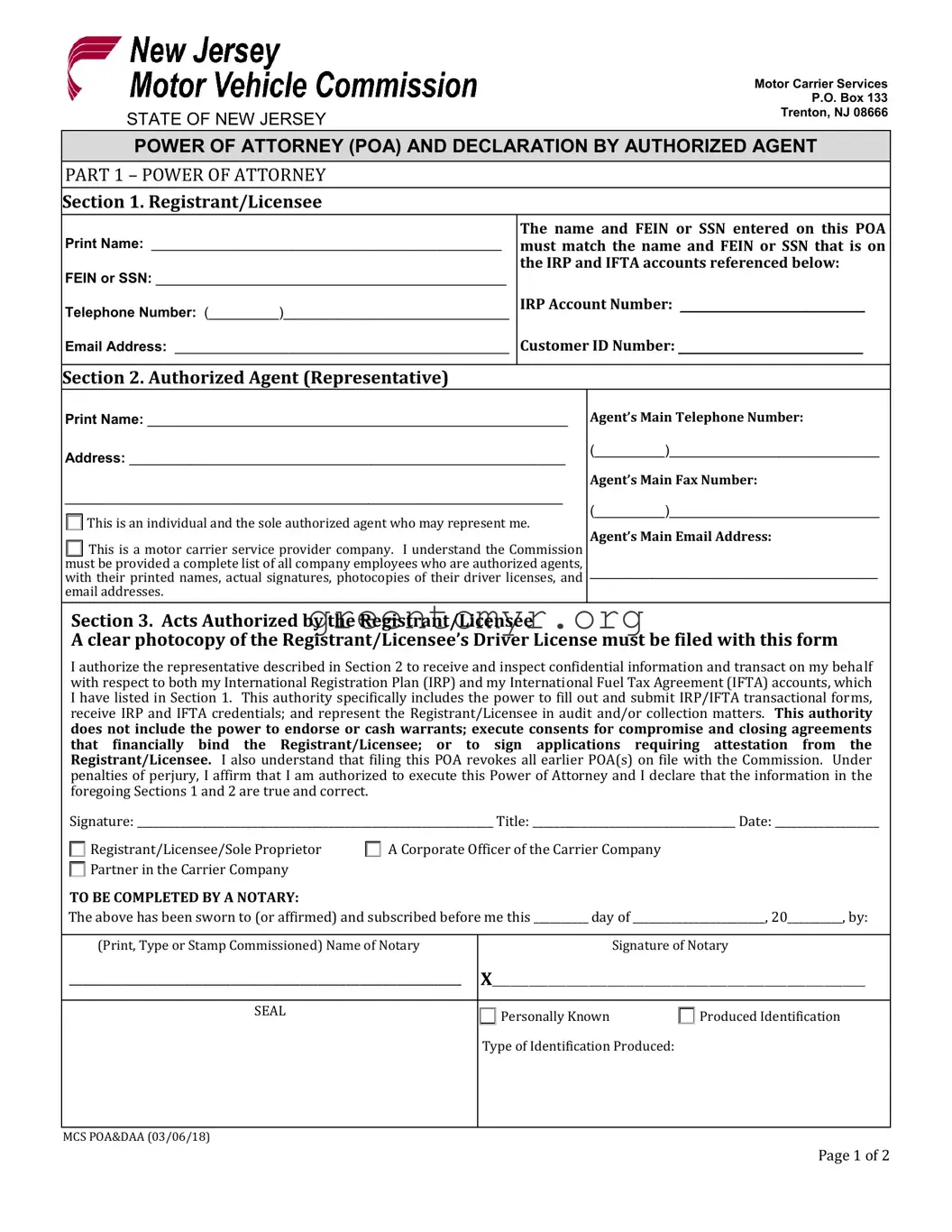Motor Carrier Services
P.O. Box 133
Trenton, NJ 08666
POWER OF ATTORNEY (POA) AND DECLARATION BY AUTHORIZED AGENT
PART 1 – POWER OF ATTORNEY
Section 1. Registrant/Licensee
Print Name: _____________________________________________
FEIN or SSN: _____________________________________________
Telephone Number: (_________)_____________________________
Email Address: ___________________________________________
The name and FEIN or SSN entered on this POA must match the name and FEIN or SSN that is on the IRP and IFTA accounts referenced below:
IRP Account Number: ______________________
Customer ID Number: ______________________
Section 2. Authorized Agent (Representative)
Print Name: ______________________________________________________
Address: ________________________________________________________
________________________________________________________________

 This is an individual and the sole authorized agent who may represent me.
This is an individual and the sole authorized agent who may represent me.
This is a motor carrier service provider company. I understand the Commission must be provided a complete list of all company employees who are authorized agents, with their printed names, actual signatures, photocopies of their driver licenses, and email addresses.
Agent’s Main Telephone Number:
(_________)___________________________
Agent’s Main Fax Number:
(_________)___________________________
Agent’s Main Email Address:
_____________________________________
Section 3. Acts Authorized by the Registrant/Licensee
A clear photocopy of the Registrant/Licensee’s Driver License must be filed with this form
I authorize the representative described in Section 2 to receive and inspect confidential information and transact on my behalf with respect to both my International Registration Plan (IRP) and my International Fuel Tax Agreement (IFTA) accounts, which I have listed in Section 1. This authority specifically includes the power to fill out and submit IRP/IFTA transactional forms, receive IRP and IFTA credentials; and represent the Registrant/Licensee in audit and/or collection matters. This authority does not include the power to endorse or cash warrants; execute consents for compromise and closing agreements that financially bind the Registrant/Licensee; or to sign applications requiring attestation from the Registrant/Licensee. I also understand that filing this POA revokes all earlier POA(s) on file with the Commission. Under penalties of perjury, I affirm that I am authorized to execute this Power of Attorney and I declare that the information in the foregoing Sections 1 and 2 are true and correct.
Signature: _________________________________________________________________ Title: _____________________________________ Date: ___________________
Registrant/Licensee/Sole Proprietor |
A Corporate Officer of the Carrier Company |
Partner in the Carrier Company |
|
TO BE COMPLETED BY A NOTARY:
The above has been sworn to (or affirmed) and subscribed before me this __________ day of ________________________, 20__________, by:
(Print, Type or Stamp Commissioned) Name of Notary |
|
Signature of Notary |
_____________________________________________________________________________________ |
X_________________________________________________________________________________ |
|
|
|
SEAL |
Personally Known |
Produced Identification |
|
|
Type of Identification Produced: |
MCS POA&DAA (03/06/18) |
|
Page 1 of 2 |
|
Name of Registrant/Licensee: ____________________________________________FEIN or SSN:______________________________
PART II – DECLARATION OF AUTHORIZED AGENT (REPRESENTATIVE)
I understand that the Power of Attorney (POA) on the forgoing page of this form is not valid until it is signed and dated by the Registrant/Licensee in the presence of a notary; the Declaration of Authorized Agent (Representative) on the present page is signed and dated by me; and this completed (two-page) form has been filed with the New Jersey Motor Vehicle Commission.
Under penalties of perjury, I declare that:
•With respect to the forgoing POA related to the International Registration Plan (IRP) and the International Fuel Tax Agreement (IFTA), I am the individual (or officer of the motor carrier service provider company) authorized to represent the Registrant/Licensee identified in Section 1, in the matters specified in Section 3.
•If applicable, I have attached (or have previously filed with Motor Carrier Services) a complete list of the printed names, respective signatures, email addresses, and copies of the driver licenses of all authorized agents employed by my company to represent IRP Registrants and IFTA Licensees.
•I am (and if applicable, the authorized agents of my company are) familiar with the plan requirements of the IRP and IFTA.
•I am (and if applicable, the authorized agents of my company are) familiar with the business procedures of the New Jersey Motor Vehicle Commission as they relate to IRP and IFTA transactions, and I am (we are) willing and able to follow these procedures on behalf of the Registrant/Licensee.
•The Authorized Agent information provided in Section 2 of the forgoing document is true and correct.
•This form must be notarized and cannot be altered, changed, whited out or deleted in any fashion. Any edits will be rejected.
Printed Name: __________________________________________________________ |
Date: _______________________________________ |
Signature: X____________________________________________________________ |
|
Name of the Service Provider Company (if applicable): |
|
MCS POA&DAA (03/06/18)
Page 2 of 2



 This is an individual and the sole authorized agent who may represent me.
This is an individual and the sole authorized agent who may represent me.